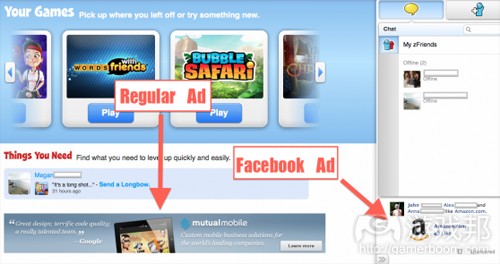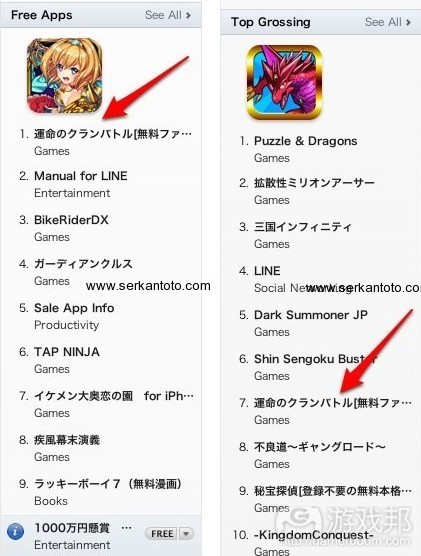每日观察:关注Facebook将取消Facebook Credit(6.25)
1)据venturebeat报道,Facebook日前宣布公司已向Zynga.com投放广告,但他们并未与Zynga共享用户或广告商信息,广告商在此也并没有任何新的匹配标准。
用户如果使用Facebook帐号登录Zynga.com,就可以看到Facebook广告。Facebook曾在去年的S-1文件修订版本中指出,公司曾与Zynga达成广告合作协议,允诺将在未来给予Zynga额外的广告支持,这次出现于Zynga.com的Facebook广告可能就是该协议所指到的一种合作,两者将对广告收益进行分成。
2)市场调研公司Newzoo最近报告预测,土耳其电子游戏市场规模将达4-5亿美元,预计社交及在线多人游戏将占比30%。
3)据insidesocialgames报道,美国阿林顿市的一名妇女因盗用某公司信用卡,在社交游戏《FrontierVille》中消费1万美元而被捕。
4)据techcrunch报道,Facebook日前通过其开发者博客宣布将于今年末中止Facebook Credit项目,将像iTunes一样支持用户将Facebook帐号与信用卡绑定,直接使用本国货币充值和购买虚拟商品。如果用户得到Facebook礼品卡,则可将其中的奖励码添加到自己的帐号中,直接进行充值。
观察者认为,Facebook曾在S-1文件中指出,去年共有1500万用户购买过Facebook Credit,这意味着Facebook可能已经掌握了1500万个信用卡帐号。等到Facebook App Center今年推出付费应用,可能会有5000万(即5%)的Facebook用户付费购买应用、虚拟商品等付费内容。
5)大众融资平台Kickstarter最近公布数据显示,游戏是该平台成功率最低的融资项目类型之一,仅有三分之一项目融资达标,这一比例远低于Appsblogger之前报告的数据。
Kickstarter指出在其平台上的13种项目类型中,所有项目平均成功率为44%,成功率低于游戏的分别是时尚、发行和科技这三个类型。
该平台数据还指出,在达标的近700个游戏项目中,有95%的项目融资额少于10万美元。目前仅有Double Fine, InXile Entertainment (作品《Wasteland 2》)和Harebrained Schemes(作品《Shadowrun Returns》)这三个游戏项目融资额超过100万美元。
在该平台获得成功的游戏项目至今融资额共2640万美元,这一数额仅次于设计、音乐、影视项目。
6)据serkantoto报道,东京社交游戏开发商Pokelabo及日本发行商世嘉推出的游戏《Unmei No Clan Battle》(游戏邦注:英文名为“The Clan Battle Of Fate”)最近在日本App Store免费iOS应用榜登顶,在营收应用榜单排名第七。
这是一款即时社交卡牌战斗游戏,但并未投放Mobage或GREE平台。采用同种“独立”策略的《Puzzle & Dragons》(GungHo作品)和《Diffusion Million Arthur》(Square Enix作品)目前仍是日本App Store应用营收榜单排名第一和第二的游戏,值得注意的是排名第三和第五的游戏也是这种“非Moboage或GREE”游戏。
7)据Venturebeat报道,网页游戏公司Roadhouse Interactive日前收购社交/手机游戏公司The Embassy Interactive,以便借此进军Facebook及手机游戏领域。
The Embassy Interactive成立于2008年,曾推出基于UFC职业摔跤赛的Facebook游戏以及一款名为《Tangram Puzzle Pro》的iOS游戏,该公司今后将更名为Roadhouse Games Studios。(本文为游戏邦/gamerboom.com编译,拒绝任何不保留版权的转载,如需转载请联系:游戏邦)
1)Watch out Google, Facebook ads appear on Zynga.com
Meghan Kelly
Google jumped into Facebook’s territory when it launched its Google+ social network last year. Now Facebook seems to be jumping in to compete with Google in the advertising space. External ads from the social network are appearing on Zynga.com — the first of their kind outside of Facebook’s own domain.
“People may now see ads and sponsored stories from Facebook on Zynga.com,” said Facebook in a statement to VentureBeat. “We don’t share any information about people or advertisers with Zynga and advertisers do not have any new targeting criteria.”
The advertising appears once you’ve logged into Zynga.com with your Facebook account. It is otherwise unavailable. The ad I found appeared in the lower right hand corner, under my list of friends online and showed my friends who “liked” that brand and had a “sponsored” tag with the Facebook ‘F’ next to it. Zynga and Facebook have an advertising revenue share set up.
Facebook did disclose an agreement between the two companies after Zynga filed an amendment to its S-1 filing in 2011. It told Inside Facebook that it had promised to help Zynga with external advertising in the future. At that time, the social network didn’t reveal timing for the new advertising. The appearance of Facebook ads on Zynga.com does, however, make it seem possible that a home-grown Facebook ad network is on its way, even if it’s not immediately obvious how it will work.
Advertising is Facebook’s lifeblood and the ability to expand beyond walls and news feeds is a huge opportunity to take revenue away from Google. Google runs its own ad programs, such as AdSense and AdWords specifically for advertising on its search engine. Rumors also say that Facebook may decide to compete with Google in search too.
An image posted by Mark Zuckerberg (see right) soon after the company announced its intentions to go public stirred these theories. The picture showed Zuck’s laptop with Facebook pulled up. At the top of the screen was a long, thin, white bar that greatly resembled a revamped search field. Altimeter Group analyst Rebecca Leib told VentureBeat at the time that she thought a Facebook search product could “have not only very tangible advertising benefits for Facebook, but also make Facebook a more compelling place for users.”
While no such search has yet been revealed, it’s safe to assume that Facebook will be competing with Google more deeply in the near future.(source:venturebeat)
2)Turkish game market likely worth $450 million — Research and analysis group Newzoo claims consumer spending on video games in Turkey will reach somewhere between $400 million and $500 million.
It’s expected that social and massively multiplayer online games will be responsible for approximately 30 percent of this total.(source:insidesocialgames)
3)Woman steals $10,000 to play Facebook game — A woman in Arlington, WA was arrested for using a company credit card to spend almost $10,000 while playing FrontierVille. She’s charged with first-degree theft.(source:insidesocialgames)
4)Why Facebook Is Folding On Credits And Doubling Down On Payments
Peter Vogel
In a surprising move this week, with just a short post on their Developer Blog, Facebook has ended their three-year experiment with the virtual currency of Facebook Credits.
Credits will be phased out by the end of the year and users will simply have a Facebook account with a balance measured in Dollars in the U.S., or whatever currency is native to a country. Facebook’s new member accounts will function similarly to an iTunes account: a user adds a credit card to their account, digital goods can be purchased and immediately charged to the card on file, or can be drawn from stored value in that account. If you are given a Facebook gift card, in card or digital form, you would add that reward code to your account and that value would be stored until you use it – just like an iTunes gift card is added to your account and stored until spent.
But does this change imply that Facebook is less committed to becoming a dominant force in the Payments space? Facebook did generate 15 percent of their 2011 revenue from Payments, primarily from Facebook Credits used in social games.
Absolutely not!
I predicted that Facebook’s revenue from Payments will double every year for the next five years and still stand by that prediction – Credits or no Credits. This is not a significant change in Facebook’s strategy, just a different name for the currency being exchanged; instead of ‘Credits’ which Facebook invented, users will make purchases in their native currency – for example, Dollars in the U.S.
We still expect media providers like Netflix, Spotify and The Washington Post to offer digital goods for sale on Facebook – paid apps are coming to Facebook’s App Center very soon.
We still expect Facebook to be become a dominant player in the Payments space, similar to a PayPal. Last year, 15 million people bought Facebook Credits, according to their S-1 filing, so it’s assumed Facebook has close to 15 million credit cards on file. By the end of this year, once paid apps are added to Facebook’s App Center, it wouldn’t be surprising if 50 million people, or about five percent of Facebook’s users are purchasing apps and other digital good, like movies, music and TV episodes, which means Facebook would have a pool of 50 million people who have entrusted it with their credit card information
At that point it’s a very short distance to a “Pay with Facebook” blue box showing up every time you make an online purchase (on web sites everywhere, not just on Facebook). Why re-enter your credit card number when you already trust Facebook to handle the transaction and bill your card? For users this could be seen as more convenient and safer than entering their credit card number on multiple sites. Facebook is PayPal on steroids, with the strength of a billion members.
And then, what’s to stop Facebook from introducing a Facebook Credit Card? Facebook could be bigger than PayPal and become Visa or MasterCard as well. Facebook has the potential to become a universal wallet for both online and offline purchases.
In a recent article at The Daily Beast, Steven Weiss makes an extremely compelling argument why this is the next logical step for Facebook:
“Millions of us are already using Facebook to log on to other sites to comment on articles, share information, or register a product. With FacebookCard added to our Facebook accounts, all we have to do is use that same login, and the transaction is done. Want to ship a gift to your mom? Just select her from your Facebook friends at checkout.”
Ironically, it’s the enormous potential of Payments as a revenue source that is causing Facebook to phase out the Credits currency. Payments as a revenue source is too important to Facebook’s future to take the risk of promoting an untested and unproven currency. To establish Facebook Credits, Facebook would have had to spend significant resources educating the public and building the brand of Credits. It’s a much easier solution to simply transact in an already established currency that users understand and utilize.
In addition, it’s also speculated that with the growth and establishment of a new currency, Facebook would have faced increasing legal and regulatory scrutiny.
Switching to an existing currency allows Facebook to focus on what they’re best at, providing a platform and allowing others to innovate and create value for members.
What Facebook is aiming to become best at next is providing a platform where consumers are comfortable buying the products/applications they find valuable and developers/innovators can generate significant revenue by selling the products they are building. Once paid apps are introduced to the App Center, this massive wave of commerce will start building.
And it’s the companies who can successfully surf the ups and downs of this wave that will profit most heavily.(source:techcrunch)
5)Kickstarter success rate for games even lower than initially reported
by Eric Caoili
Crowdfunding platform Kickstarter has released internal data showing that game projects have one of the lowest success rates on the service, with only a third of them hitting their pledge goals.
That’s significantly lower than the success rate previously reported by Appsblogger, which scraped data from Kickstarter’s campaigns to determine how projects are faring on the platform (unlike Appsblogger’s infographic, Kickstarter’s charts do not include active campaigns).
It was previously believed that the success rate for the games category, which also includes board and card games in addition to video games, was around 43 percent — a number of developers have pointed out that this is higher than what they expected, and can be a higher than rate than submitting games to a publisher.
The average success rate for all 13 project types on Kickstarter is 44 percent — the only categories with lower success rates than games are fashion, publishing, and technology.
Kickstarter’s data also showed that of the nearly 700 game campaigns that have hit their funding goals, 95 percent of them were targeting less than $100,000. Three developers have made brought in over a million on the platform so far: Double Fine, InXile Entertainment (Wasteland 2), and Harebrained Schemes (Shadowrun Returns).
Successfully funded game projects have so far raised $26.4 million on Kickstarter, one of the highest totals out of all the categories, behind design, music, and film and video. (source:gamasutra)
6)Unmei No Clan Battle: Another Platform-Free Hit Social Game In The Making [Social Games]
by Dr. Serkan Toto
Unmei No Clan Battle (“The Clan Battle Of Fate”), a mobile social RPG released by Tokyo-based social game maker Pokelabo and Sega today, is off to a terrific start.
The iOS title is currently the top free app in the Japanese App Store and shot up to No. 7 in the ranking of the top grossing apps (see below). It’s only available in the Japanese App Store (link).
Not too surprisingly, Unmei is designed as a social card battle game in which players form clans and battle it out with each other. The twist: these battles are happening in real-time, four times a day, with up to 20 players max. against another clan of 20 players max. There are also the usual quests (that can be started anytime) to boost the parameters of the cards.
A major bullet point here is that even though Unmei is a “classic” social game, it isn’t being distributed through the Mobage or GREE platforms. Pokelabo and Sega, which became close partners in October, decided to place the game “directly” in the App Store instead.
I know this doesn’t make the game “platform-free” per se, but it puts the title in a series of social games that don’t use the dominant social platforms in Japan.
Puzzle & Dragons (from GungHo) and Diffusion Million Arthur (from Square Enix) are the two biggest hits following this strategy so far. These games are still the top 1 and 2 grossing apps in the Japanese App Store, and there more social games not using Mobage or GREE in that ranking – i.e. the No. 3 and 5.
Mobage operator DeNA and GREE have not that much reason to worry though, at least not currently: most of their smartphone games are being offered as browser versions, not as apps. For example, there are around 5 times more browser-based games being offered on Mobage at the moment than “app-based” games.
Here are some Unmei No Clan Battle screenshots.
It looks like Pokelabo/Sega have “taken a very good look” – in terms of character design during battle scenes- at Final Fantasy Brigade.(source:serkantoto)
7)Roadhouse buys social/mobile game maker The Embassy Interactive
Rob LeFebvre
Roadhouse Interactive makes free-to-play games for brands with established intellectual property, such as 20th Century Fox’s popular TV show Family Guy.
To date, the company has focused on browser-based games for the mid-core gaming market, but now it’s acquiring social/mobile game studio The Embassy Interactive to help it extend into Facebook and mobile games. Embassy was founded in 2008 to bring film and gaming experts together to work on games for Facebook and mobile platforms iOS and Android. It has a Facebook game based on the UFC professional wrestling franchise and an iOS game called Tangram Puzzle Pro.
The two companies will now have the combined ability to bring known brands to browsers, Facebook, and mobile platforms. The newly acquired company will operate as its own entity.
“They’re going to become Roadhouse Games Studios — it will be run as part of the Roadhouse brand — and operate as its own entity,” Roadhouse Interactive president, Tarrnie Williams, told GamesBeat by phone yesterday. “That doesn’t mean we won’t work with third-party developers — we will — but there are some smaller projects that we wanted to do. Having our own team to direct as we need will help us be more responsive to the project needs.”
Williams has worked in the gaming industry for over 20 years, including time at THQ as studio head of Relic Entertainment and at Electronic Arts in both LA and Vancouver. He has overseen game franchises like Need for Speed, Medal of Honor, NBA Live, Company of Heroes, Dawn of War, and EA SPORTS Active 2.
“We see the space between Halo 4 and ATM-ville. We believe the world needs higher quality and deeper experiences in free-to-play games in the social, mobile, and web browser online spaces,” said Williams. “This is where the eyeballs and excitement are. There’s no barriers to entry for consumers, and so this is where we’re focused. It’s an exciting time.”
Vancouver-based Roadhouse Interactive was founded by James Hursthouse, Ian Verchere, and Williams in December 2009. In addition to its Family Guy Online game, which launched in April, the company is also behind MechWarrior Tactics, a turn-based strategy game for Infinite Game Publishing. The company says it’s currently working on one additional Web-based title and two mobile titles, one of which may turn into a Facebook title.
Vancouver-based The Embassy Interactive was formed in 2008 by film and game industry veterans with the concept of exploring the potential of “converging media.” It’s been funded by Embassy VFX, a visual effects studio with credits that include Iron Man, District 9, and Battleship.
Both companies are privately funded. Williams declined to disclose the price of acquisition, or other financial details.(source:venturebeat)











































 闽公网安备35020302001549号
闽公网安备35020302001549号